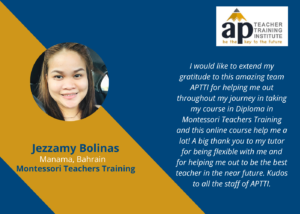Criteria for Montessori Teacher Training
Introduction:
Finding out how to become a Montessori teacher shows a road full of passion and purpose. On this journey, the Montessori Teacher Training program is the most important part. It is a life-changing experience that teaches future teachers Maria Montessori’s ideas and methods. But what exactly are the requirements for people to be able to join such prestigious programs?
Experience in Early Childhood Education:
An important requirement for starting Montessori Training is usually having worked with young children before. Whether you work in a preschool or do volunteer work, getting to know the stages and details of young children’s growth is a great way to get a good grasp on the Montessori method.
Educational Background:
Even though a certain degree isn’t always required, having experience in education or a related area can make you a much stronger candidate for Montessori Teacher Training. Many schools that offer these programs prefer applicants with degrees in education, psychology, child development, or related fields. This is because these degrees provide a theoretical background to support the actual training.
Alignment with Montessori Principles:
Sincere dedication to the principles of Montessori is like a lighthouse that points potential trainees in the right direction. The core tenets of Montessori education, which emphasize child-centered learning, respect for individual pace and style, and encouraging independence and autonomy in students, are frequently sought after by Teacher Training Institutes.
Readiness for Hands-On Learning:
A big part of the Montessori philosophy is the idea that kids learn best by doing. So, people who want to get into Montessori Teacher Training programs should show that they are ready to learn through hands-on, engaging experiences. It is very important to be ready to get hands-on with Montessori education, whether it’s through classroom observations, practice teaching sessions, or workshops where you make materials.
Commitment to Ongoing Professional Development:
Signing up for a Teacher Training course isn’t just a short-term goal; it’s a promise to keep learning and grow professionally throughout your life. Institutes often look for applicants who are eager to keep learning about the best ways to teach Montessori and who are passionate about making things better all the time. This dedication can show up in the form of going to classes, conferences, or working towards certifications that go beyond the basic training.
Conclusion:
Finding out if you meet the requirements for Montessori Teacher Training programs shows you a complex world where experience, education, philosophy, and devotion all come together. Aspiring teachers can become stewards of Montessori education and shape the minds and hearts of future generations with wisdom and compassion by developing a deep understanding of how children learn and grow, a commitment to Montessori principles, and a readiness for hands-on learning.






